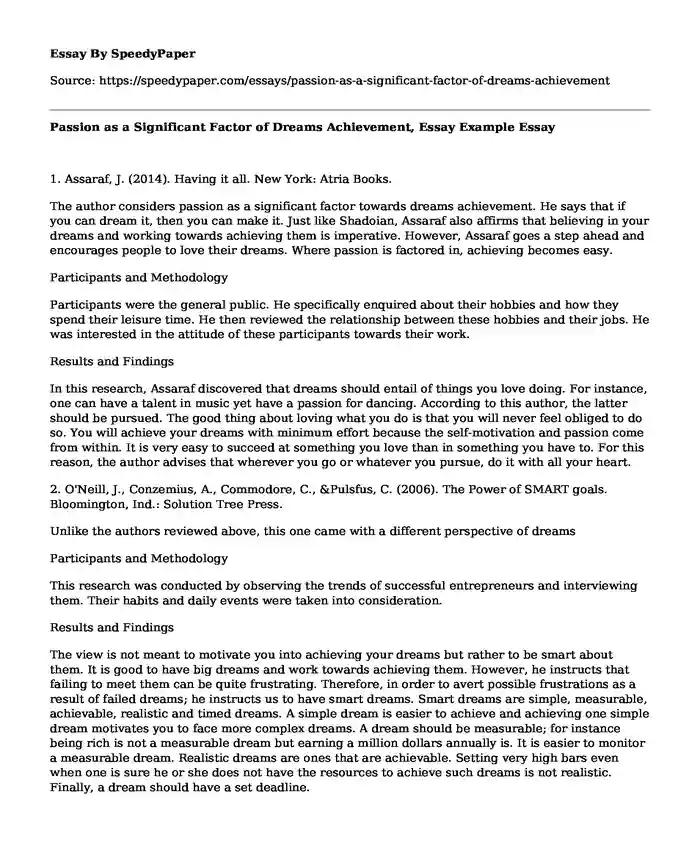
| Type of paper: | Essay |
| Categories: | Inspiration Psychology Philosophy |
| Pages: | 3 |
| Wordcount: | 730 words |
1. Assaraf, J. (2014). Having it all. New York: Atria Books.
The author considers passion as a significant factor towards dreams achievement. He says that if you can dream it, then you can make it. Just like Shadoian, Assaraf also affirms that believing in your dreams and working towards achieving them is imperative. However, Assaraf goes a step ahead and encourages people to love their dreams. Where passion is factored in, achieving becomes easy.
Participants and Methodology
Participants were the general public. He specifically enquired about their hobbies and how they spend their leisure time. He then reviewed the relationship between these hobbies and their jobs. He was interested in the attitude of these participants towards their work.
Results and Findings
In this research, Assaraf discovered that dreams should entail of things you love doing. For instance, one can have a talent in music yet have a passion for dancing. According to this author, the latter should be pursued. The good thing about loving what you do is that you will never feel obliged to do so. You will achieve your dreams with minimum effort because the self-motivation and passion come from within. It is very easy to succeed at something you love than in something you have to. For this reason, the author advises that wherever you go or whatever you pursue, do it with all your heart.
2. O'Neill, J., Conzemius, A., Commodore, C., &Pulsfus, C. (2006). The Power of SMART goals. Bloomington, Ind.: Solution Tree Press.
Unlike the authors reviewed above, this one came with a different perspective of dreams
Participants and Methodology
This research was conducted by observing the trends of successful entrepreneurs and interviewing them. Their habits and daily events were taken into consideration.
Results and Findings
The view is not meant to motivate you into achieving your dreams but rather to be smart about them. It is good to have big dreams and work towards achieving them. However, he instructs that failing to meet them can be quite frustrating. Therefore, in order to avert possible frustrations as a result of failed dreams; he instructs us to have smart dreams. Smart dreams are simple, measurable, achievable, realistic and timed dreams. A simple dream is easier to achieve and achieving one simple dream motivates you to face more complex dreams. A dream should be measurable; for instance being rich is not a measurable dream but earning a million dollars annually is. It is easier to monitor a measurable dream. Realistic dreams are ones that are achievable. Setting very high bars even when one is sure he or she does not have the resources to achieve such dreams is not realistic. Finally, a dream should have a set deadline.
Conclusion
From the review of the six books, the evidence gained supports my hypothesis.
Hypothesis 1 - What is the impact of these factors in dream actualization? (Non-Directional)
For a dream to be made a reality, a couple of factors have to be present. For instance, one can be so motivated and have SMART dreams but without resources, the dream never goes through. Similarly, resources and finances might be available but if the individual is not well-motivated to work on the dream, it fails all the same.
Hypothesis 2 - Are intrinsic factors more important than extrinsic ones in dream actualization? (Directional)
From the various works cited and literature reviews, it can be concluded that as much as all factors are crucial for dream accomplishment, intrinsic factors play a big role in the success of a dream as compared to extrinsic. Ambition and self-motivation are the key and supersede resources and environment.
Hypothesis 3 - How important is dream evaluation? (Directional, secondary hypothesis)
It is human to want the best out of life. Failure and frustrations are not accepted well by humans. To avoid these frustrations, it is important to evaluate a dream prior to working on it.
References
Assaraf, J. (2014). Having it all. New York: Atria Books.
Balu, L. (1997). Believe in your dreams, not in your fears. Pittsburgh, Pa.: Dorrance Pub. Co.
Grant, A. & Grant, G. (2012). Who killed creativity? & how do we get it back?. Hoboken, N.J.: Wiley-Blackwell.
Knapp, G. (2007). Building the American dream. Bloomington, IN: AuthorHouse.
O'Neill, J., Conzemius, A., Commodore, C., &Pulsfus, C. (2006). The Power of SMART goals.Bloomington, Ind.: Solution Tree Press.
Shadoian, J. (2003). Dreams & dead ends. Oxford: Oxford University Press.
Cite this page
Passion as a Significant Factor of Dreams Achievement, Essay Example. (2017, Nov 11). Retrieved from https://speedypaper.net/essays/passion-as-a-significant-factor-of-dreams-achievement
Request Removal
If you are the original author of this essay and no longer wish to have it published on the SpeedyPaper website, please click below to request its removal:
- Education Essay Sample: The Digital Impact and Potential Consequences
- American History Essay Example: The Development of Labor Movement
- Read about Architecture of the Main Caliphal Palace of Samarra in a Free Essay
- Mosquito Prevention Practicum in a Free Essay for Your Use
- Free Essay with Personal Statement for Working in Oracle Corporation
- Essay Sample: Should People Be Allowed to Live in California?
- Exploring Property Ownership: Legal, Economic, and Philosophical Perspectives with Emphasis on Karl Marx's Vision
Popular categories




